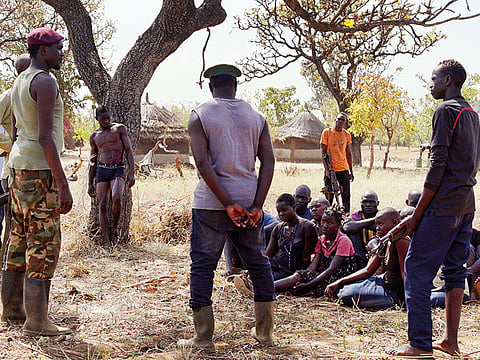Acting out their terrible past
Once warlord’s fighters, they are now becoming movie stars as Ugandan cinema booms but it’s their own deeds they now enact

KAMPALA
“I felt it all coming back, the frustrations, the helplessness and how sometimes I would feel that I just wanted to die,” said Opio, who’s now 38 and spent seven years in the LRA before fleeing and accepting a state-sponsored amnesty. “But at the end of it all, I knew it was just a movie — I had already left that real life in the past.”
I felt it all coming back, the frustrations, the helplessness and how sometimes I would feel that I just wanted to die. But I knew it was just a movie — I had already left that life in the past.”
Uganda, too, has moved on from the chaos sown by Kony’s militia, which may have been responsible for 100,000 deaths in central and eastern Africa in the past three decades. There’s been investment in oil exploration and infrastructure in the north, which the LRA terrorised until 2005, while the capital, Kampala, is touted as a hot new nightlife spot. Now at peace — and still under the iron rule of President Yoweri Museveni — US-ally Uganda is a regional heavyweight, sending troops to Somalia and South Sudan.
Joseph Kony, leader of the Lord’s Resistance Army. AFP
Hollywood versions
The country isn’t a complete stranger to Hollywood: The Last King of Scotland recreated the despotic 1970s rule of President Idi Amin, while Lupita Nyong’o played the mother of a chess prodigy in Disney’s Queen of Katwe, which takes its title from a Kampala neighbourhood.
Recent years, though, have brought a surge in locally funded films. Museveni’s drive to remain in office may have curbed political expression, but it hasn’t dampened creativity in a economy that’s almost quadrupled in size since he took power in 1986.
At least 700 Ugandan features and short films have played at festivals in the past five years, according to Ruth Kibuuka, content development manager at the Uganda Communications Commission, the industry regulator. While quality was initially “wanting,” it has “greatly improved,” she said.
There’s still a long way before Uganda challenges Nollywood, Nigeria’s film industry that produces movies at a rate second only to India’s. That’s despite the efforts of Nabwana Isaac Godfrey.
The founder of Wakaliwood, a studio that turns out scrappy, fast-paced action movies from a Kampala slum, Godfrey says he’s directed about 60 since 2005 — at less than $300 each. “The industry is growing at a very good speed and it’s passion that is driving it,” said Godfrey. His most famous production, Who Killed Captain Alex? showcases crude computer-generated effects and over-the-top violence that’s won him a cult following outside Uganda.
For director Hassan Mageye, Devil’s Chest commemorates the insurgency’s victims while showing that people have moved on. It won best feature at Uganda’s main film festival in September, but hasn’t yet been widely released. He estimated about 90 per cent of the 400-strong cast were affected by Kony’s rebellion, including some ex-fighters.
Kony, who’s been indicted by the International Criminal Court and still on the run, went on to plague South Sudan and the Central African Republic with a diminished militia. His former fighters in Uganda were mostly granted amnesty by the government, which has provided counseling and outlawed discrimination against them.
There’s a strong local appetite for stories about Uganda’s past, according to Steve Ayeny, the director of Kony: Order From Above. About half the 445 actors and extras were former insurgents. Re-enacting the lynchings and burning of villages “was not easy,” said Ayeny. who had friends killed during the period his film portrays. “Because they were the truth, we just had to deal with it and say, ya, let’s move on.”
—Bloomberg


![The incident occurred in the early hours of Tuesday in Kampani Zurak community, located in the Wase area of Plateau state. [Illustrative image]](http://media.assettype.com/gulfnews%2Fimport%2F2022%2F12%2F13%2FSTOCK-ambulance_1850a298a2c_large.jpg?w=320&auto=format%2Ccompress&fit=max)
